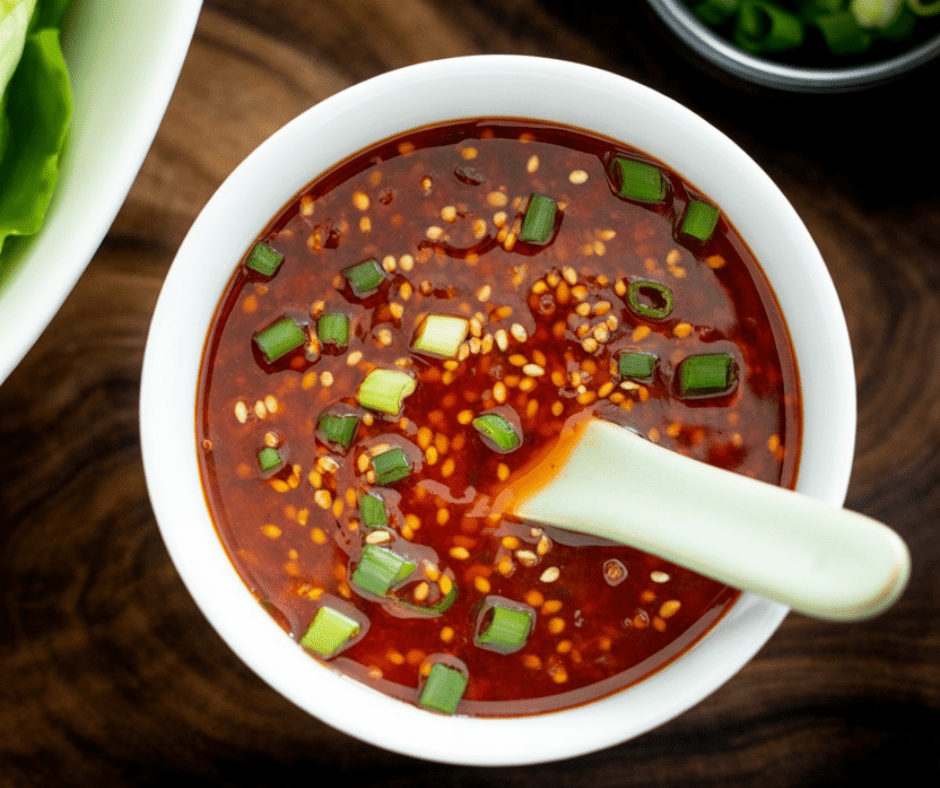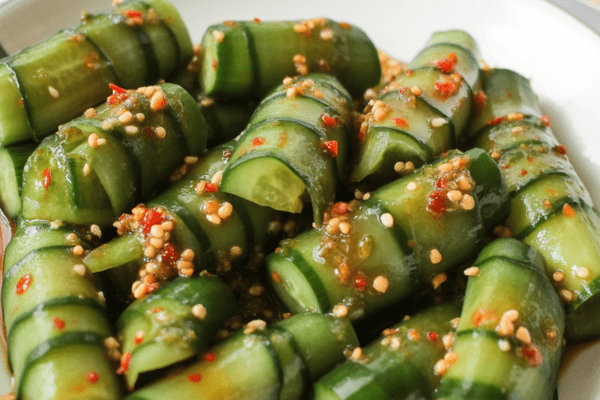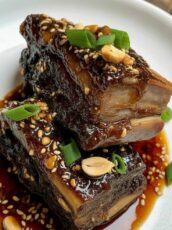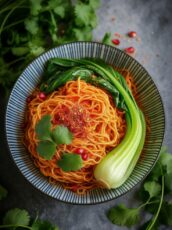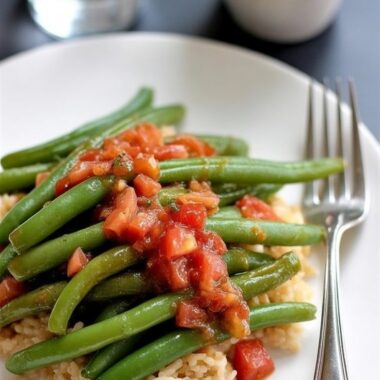Galbi, or Korean BBQ short ribs, is the kind of dish that’ll make your backyard feel like a Korean barbecue joint. The ribs are sweet, garlicky, smoky, and oh-so-tender – and the secret is in that magical marinade. If you love grilled meats that are bold in flavor and melt-in-your-mouth tender, you’re going to be all over this one.
Let’s break down what makes Galbi a true Korean classic and how you can make it right in your own kitchen (or on your grill!).
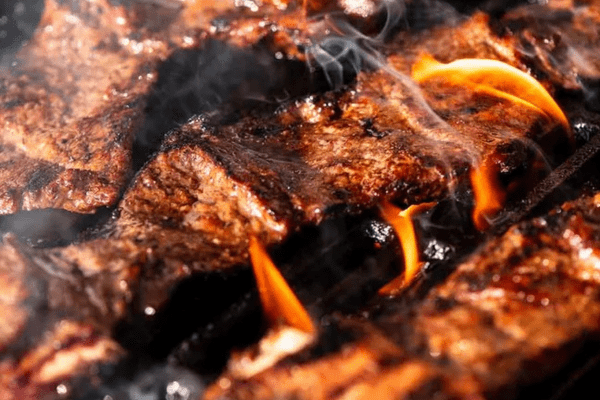
A Social Feast, Korean BBQ Style
Korean BBQ isn’t just about the food – it’s an experience. Think friends huddled around a hot grill, sizzling slices of meat, tongs in one hand and a lettuce wrap in the other. Galbi is one of the stars of this setup, and once you taste it, you’ll understand why.
These ribs are prized for their deep, beefy flavor. And thanks to a marinade that’s equal parts sweet, salty, garlicky, and fruity, they come off the grill caramelized and packed with umami. The ribs are cut in a special way that allows the meat to “unroll” into long, thin strips still attached to the bone – perfect for soaking in all that goodness and cooking quickly.
The Magic of the Korean Marinade
The real hero of this recipe is the marinade. Korean BBQ marinades aren’t your typical soy-sauce-and-sugar affair. They bring a few unique tricks to the table:
Why It Works
- Natural tenderizers: Fruits like pear, apple, kiwi, or even pineapple break down the meat’s fibers, making even tough cuts juicy and tender.
- Complex flavor: You get that punch of garlic, sweetness from fruit and sugar, umami from soy sauce, and nutty depth from sesame oil.
- Caramelization: The sugar and fruit help the ribs develop a gorgeous crust on the grill.
Ingredients You’ll Need for the Marinade
Here’s what goes into that magic marinade:
- Nashi pear (or regular pear or red apple) – It tenderizes the meat naturally while adding sweetness. Nashi is also known as Asian pear and looks like an apple but tastes like a crisp, juicy pear.
- Garlic – Loads of it! Korean BBQ doesn’t hold back.
- Ginger – Adds a subtle warmth that balances the garlic.
- Onion – Grated finely to bring depth and body to the marinade.
- Mirin – A sweet rice wine that adds a rounded flavor.
- Soy sauce – For salt and savoriness.
- Sesame oil – A must in Korean cooking.
- Sugar – Helps with caramelization and sweetness.
- Black pepper – Adds just a bit of heat.
Understanding the Cut: Korean Beef Short Ribs
This isn’t your average slow-braised short rib. Korean BBQ uses a special cut where the beef is sliced thinly across or along the bone:
- Butterflied ribs – This is the traditional Korean cut where the meat is unrolled into a long thin flap attached to the bone. Hard to find at most Western butchers but easy to grab at Korean or Asian markets.
- LA galbi / flanken cut – Ribs sliced across the bone into thinner pieces, also widely used in Korean BBQ.
- Boneless short ribs or beef oyster blade (flat iron steak) – These are great alternatives. Slice them thinly and let the marinade do the rest.
If you’re working with a whole short rib, you can butterfly it yourself – it just takes a sharp knife and a little patience.
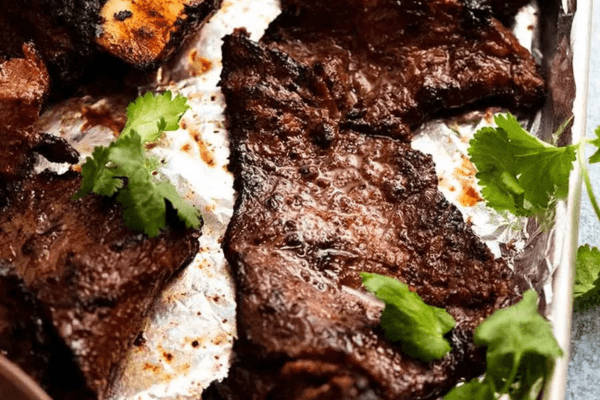
How to Make Korean BBQ Beef Short Ribs
Here’s a step-by-step on how to make these flavor-packed ribs:
- Grate and mix the marinade
Finely grate the onion, nashi pear (or apple/pear), garlic, and ginger. Mix with the rest of the marinade ingredients in a bowl. - Prepare the ribs
If you’re using the butterflied Korean cut, unroll them so the marinade can coat every bit. For boneless cuts or LA galbi, just slice thinly. - Marinate overnight
Place the beef in a container or a ziplock bag and pour in the marinade. Let it sit for at least 24 hours in the fridge – this step really matters. - Grill it up
Fire up your BBQ or get a hot skillet on the stove. Grill the ribs over high heat for 2–3 minutes per side. They’ll be well-done by the end, but don’t worry – the marinade keeps them tender and juicy. - Serve hot
These ribs are bursting with flavor, so you won’t need any dipping sauce. Just slice and enjoy!
Serving Suggestions
In true Korean style, Galbi is served with a variety of side dishes called banchan – they bring freshness and contrast to the rich meat. Here’s what I usually put out:
- Kimchi – Store-bought or homemade, this spicy fermented cabbage is essential.
- Potato salad – Korean-style with a touch of sweetness.
- Simple salad – Lettuce, corn, and onion tossed in sesame dressing.
- Stir-fried veggies – Like spinach, carrots, or bean sprouts. You can borrow ideas from bibimbap toppings.
Don’t forget a bowl of steamed white rice to catch all those delicious juices.

Storing Leftovers
If you somehow end up with leftovers (rare, but it happens), here’s how to handle them:
- Fridge: Store in an airtight container for up to 3–4 days.
- Freezer: You can freeze the marinated raw meat or the cooked ribs. Wrap tightly and freeze for up to 2 months.
- Reheating: Warm in a skillet or oven until heated through. Try not to microwave, as it can make the meat a bit tough.
FAQs
Can I use another fruit besides nashi pear?
Yes! Red apple or any sweet pear works well. Even pineapple or kiwi, but they tenderize fast, so don’t marinate longer than 12 hours if you use those.
Can I cook this in the oven?
It’s best on a grill or skillet for that charred flavor, but yes – broil it on high for a few minutes per side, watching closely so it doesn’t burn.
What cut should I ask for at the butcher?
Ask for Korean-style butterflied short ribs or flanken cut. If unavailable, grab flat iron steak or boneless short ribs and slice thin.
Korean BBQ Short Ribs

This Korean barbecue marinade works wonderfully with beef short ribs but also pairs beautifully with pork, chicken, or lamb. While it’s flavorful on the stovetop, grilling it over a barbecue delivers a more authentic Korean BBQ experience.
Ingredients
Meat:
- 1 kg / 2 lb beef short ribs, butterflied Korean-style or thinly sliced through the bone (see notes for substitutes)
- 1 tbsp vegetable oil (for cooking)
Korean Barbecue Marinade:
- 1/3 cup soy sauce (all-purpose or light soy, not dark or sweet)
- 1/4 cup brown sugar
- 2 tbsp mirin (see notes)
- 1/4 cup onion, finely grated (including juice)
- 1/4 cup nashi pear, finely grated (including juice; see notes for substitutes)
- 2 tsp garlic, finely grated
- 2 tsp ginger, finely grated
- 2 tbsp water
- 1 tbsp toasted sesame oil (see notes)
- 1 tsp black pepper
Optional Garnishes and Sides:
- Green onion, sesame seeds, cilantro leaves
- Kimchi Fried Rice
- Smashed Cucumbers
Instructions
- Whisk all marinade ingredients together in a bowl.
- Place the beef in a ziplock bag or non-metal container. Pour the marinade over the meat and mix to coat thoroughly. Cover and refrigerate for 24 hours.
- Remove the beef from the marinade and discard the marinade.
- BBQ: Heat the grill on high until it’s smoking hot. Brush the grill with vegetable oil. Lay the beef on the grill and cook for 2 minutes on one side until caramelized. Flip and cook the other side. Remove and loosely cover with foil. Repeat with remaining beef.
- Cut beef into pieces that fit your skillet. Heat oil in the skillet over high heat. Cook beef for 2 minutes on one side until caramelized, flip, and cook the other side for 2 minutes.
- Garnish with green onions and sesame seeds if desired. No extra sauce is necessary – the flavor is built into the meat. Serve with sides like Kimchi Fried Rice and Ginger Smashed Cucumbers if desired.
Notes
- Beef Cut: Korean BBQ uses short ribs either sliced through the bone (~0.7 cm thick) or butterflied so the meat spreads out with the bone still attached. This style ensures quick cooking and great texture. Slicing through the bone requires specialized equipment; butterflying requires careful knife skills and the right cut of ribs.
- Best alternatives: Boneless short ribs, sliced
Beef oyster blade (flat iron steak) – slice 0.5 cm thick, marinate, and cook as directed. Freeze for 1 hour before slicing to make it easier. - Mirin: A Japanese sweet cooking sake. Substitute with 1 tbsp Chinese cooking wine or cooking sake. If unavailable, omit.
- Nashi Pear: Adds sweetness and helps tenderize. Substitute with regular pear or any red apple.
- Sesame Oil: Use toasted sesame oil (brown in color). Untoasted (yellow) is less flavorful and harder to find.
- Storage:
Marinated beef can be frozen immediately – it will marinate as it thaws.
Cooked beef keeps for 4–5 days in the fridge but is best fresh.
Nutrition Information:
Yield: 4 Serving Size: 1Amount Per Serving: Calories: 966Total Fat: 66gSaturated Fat: 26gTrans Fat: 3gUnsaturated Fat: 39gCholesterol: 261mgSodium: 1499mgCarbohydrates: 31gFiber: 3gSugar: 17gProtein: 64g
Asianplated.com, occasionally offers nutritional information for recipes contained on this site. This information is provided as a courtesy and is an estimate only. This information comes from online calculators. Although allchickenrecipes.com attempts to provide accurate nutritional information, these figures are only estimates.
Final Thoughts
If you’ve never tried making Galbi at home, this is your sign. It’s surprisingly simple once you get the right cut, and that marinade is like a cheat code for insanely flavorful beef. Gather some friends, fire up the grill, and make it a Korean BBQ night to remember.
Try other korean recipes:

